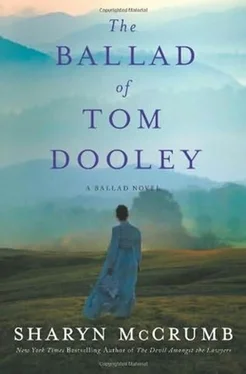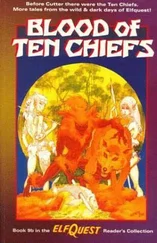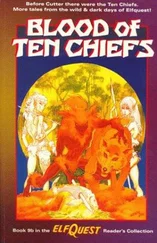June 26, 1866
The next day, J.W. Winkler and a host of his neighbors went out combing the woods again. They all spread out, one right next to the other, and walked forward in a straight line, same as people say the Redcoats used to do when they marched in to battle during the Revolution. Spread out like that, the searchers were sure not to miss a single foot of ground as they went along. They kept up that battle formation, walking in circles outward from the Bates’ place. Sure enough, when they got to a clearing just north of the abandoned farmstead, one of the searches noticed a broken bit of flax rope tied to a dogwood. They reckoned it matched the broken lead rein on the halter of Wilson Foster’s wayward mare.
That discovery fixed their attention on the clearing, and they all fanned out now within that small area, practically bumping into one another in their eagerness to examine every inch of ground. I wasn’t there, but afterward they would tell anybody who would listen about what happened out in that clearing. Before too long, one of the searchers, who had his eyes fixed upon the ground, spied a patch of red on the bare earth about a hundred yards from where the rope was found, and they reckoned it was a bloodstain, and that the killing had been done there.
When I heard about that a day or so later, I caught my breath, and scarcely dared to let it out again, for I thought that surely after finding blood and rope, they’d keep combing over the underbrush in that clearing until they discovered the burial. But I need not have worried about it, for I was wrong about Laura’s resting place. After the excitement of their discoveries had worn off, they all went back to the general store to boast of their adventures, and I suppose they might have had a few drinks to celebrate their success.
After that it would have been getting on toward suppertime, and the search party began to come apart. Before long they had all gone their separate ways, and with all the farm chores that needed doing this time of year, none of them could spare the time to come back another day to continue the hunt for more signs of Laura Foster. I was disgusted with them for quitting the hunt when I reckoned they were close enough to spit on the grave, but of course I had to keep quiet about it, and just as well that I did, for I had guessed wrong. When they didn’t stumble upon the grave, I resolved to find out the truth of the matter.
It was the end of June by then, and they had no real proof that Laura was dead, but the rope and the bloodstain gave folks in the settlement plenty to talk about, and, in the evenings and on Sundays after preaching, they yammered loud and long over what they reckoned the rights of the case to be. By now nobody really doubted that Wilson Foster’s daughter was dead. The horse had found its way home, and its rider could not have got far without it, not without being seen, anyhow, for all of Wilkes County and Watauga County besides were looking out for her.
The lack of a corpse did not stop the settlement from declaring that murder was done, and generating a lot of hot air trying to get to the bottom of it. Most of the speculating centered on Tom Dula, because he was known to be carrying on with her, and most people thought she had been intending to elope with him. You wouldn’t catch me disputing their conclusions. Tom Dula was not the marrying kind; he did not care a fig for Laura Foster; and he had no reason to elope with her if he did want to marry her-but if the citizens of Elkville were too slow to work that out for themselves, they’d get no help from me. I just wish they had pitched on Ann as the culprit.
She heard all the scandal mongering, though, and it gave her fits. She wept and stormed and told anybody who would listen that Tom was innocent-which was true enough, but not a soul believed her. When he came to the house now, they huddled in corners and talked in whispers. I contrived to listen, when I could.
Finally, when the whispers grew louder than a swarm of bees, Tom made up his mind, and all Ann’s tears could not deter him.
***
It was the last Monday in June, two days after Winkler and his searchers had found the flaxen rope and the bloodstain in the clearing, that Tom called on the Hendricks family, trying to convince them to stop telling all and sundry that he was guilty. He got no joy from that meeting, though.
“We won’t quit till we’ve found her and hanged her killer,” they told him. “The farmers may have to quit searching and go back to tending their fields, but Colonel Isbell vows that he won’t stop searching until he finds that poor girl, and a prosperous gentleman like him has all the time in the world.”
Tom laughed at that. “ Colonel Isbell! Why he wasn’t nothing but a captain in the 22nd North Carolina. I reckon these days a colonel is just a captain with money.”
Since Colonel Isbell is about the richest man there is in Happy Valley, that remark of Tom’s probably shocked the Hendrickses about as much as the thought of murder. Anyhow, Tom said he could see it was no use trying to talk sense into them, so at last he came away, and that evening he showed up at the Meltons’, as downcast as I’ve ever seen anybody.
Even before that Ann must have known that the situation was grim. That afternoon while James was out in the field, and I was supposed to be weeding the garden, I went inside to rest awhile with a cup of water, and I found Ann kneeling on her bed, and tearing a piece of clapboard off the log wall behind it, so that the logs and mud chinking showed through. Then she took a long nail and poked a hole through the chinking between the logs, and she was trying to pass a piece of string through the hole.
I had seldom seen her so industrious, and I stood there in the doorway for a minute or two watching her go at it. Finally I wearied of seeing her wrangling that string, and I spoke up. “What are you doing now, Ann?”
The nail clattered to the floor, and she turned on me with stricken eyes. “Don’t you never sneak up on me like that, Pauline!”
I shrugged. “Wasn’t trying to catch you at anything. It’s hot outside. I just came in for water.”
She sneered, “Any excuse not to work!”-which was rich coming from someone who never did anything herself.
She eased down off the bed and picked up a knife that had been lying in the folds of the quilt. I caught my breath, thinking she might mean to make a run at me with it, but she simply turned away and pushed the knife between the head of the bed and the wall. I said nothing about it, and neither did she.
I got my water, and sat down on a stool, sipping it, while she went back to coaxing the string through the hole. When at last it went all the way through, she gave a little cry of satisfaction, picked up the nail and one of James’s shoe-making mallets from his workbench, and she swept past me and out into the yard. I didn’t follow her, but presently I heard a tapping on the wall outside, so I went out to see what she was doing, taking care not to let her catch sight of me again, for she was agitated. I saw that she had found the bit of string that she’d poked through the hole in the cabin wall, and now she was tying the end of it around the nail she had just driven into the outside wall.
Now that is meant for a signaling device, I thought to myself, and there could be but one person that she would want to summon her in such a way. I reckoned she planned to tie the other end of the string around her wrist when she went to bed. She means to slip out tonight and talk in private. This was a strange twist of events, because they had never resorted to sneaking around before. Tom always came in, bold as brass, and saw her at any hour he pleased. So why were they fixing up a signal string now? I resolved to keep off the whiskey tonight, so that I could stay awake and see what transpired.
Читать дальше












